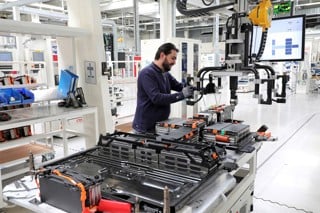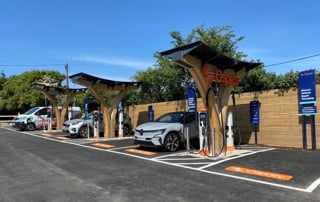A £41 million Energy Superhub with the power to charge hundreds of electric vehicles at the same time is to be built in Oxford to help “kickstart an EV revolution”.
By 2020 the Energy Superhub Oxford (ESO) consortium will launch the world’s largest lithium-ion/vanadium redox flow machine energy storage system (50 MW) and a network of around 100 ultra-rapid and fast charging stations connected directly to the extra-high voltage transmission system.
Money-saving ground source heat pumps will subsequently be installed in around 300 buildings and homes.
The project will showcase cutting-edge EV charging, energy storage systems, low carbon heating and smart energy management technologies.
Tom Hayes, executive board member for a safer and greener environment at Oxford City Council, said: “The City Council is working towards a Zero Carbon Oxford to tackle dangerous climate change in the time available to us to save the planet.
“Uniquely, this £41m once-in-a-generation downpayment on Oxford will move the Council closer to achieving this vision.
“This exciting project will enable the city council to install more electric vehicle charging points of the kind that charge vehicles quickest.
“It gives black cab drivers additional support to shift from 100% diesel today to 100% electric in the next few years.
“It enables the council to move our own vehicles to electric on a faster timescale and, crucially, to install heat energy across homes to tackle fuel poverty.”
The consortium partners are Oxford City Council, Pivot Power, Habitat Energy, Kensa Contracting, redT energy and the University of Oxford.
UK Research and Innovation (UKRI) will contribute £10 million through the Industrial Strategy Challenge Fund.
Project Local Energy Oxfordshire (LEO) led by Scottish and Southern Electricity Networks (SSEN) has also received funding. LEO will explore how the growth in local renewables, electric vehicles (EVs), battery storage, and demand side response can be supported by a local, flexible, and responsive electricity grid unlocking new opportunities for consumers and market providers.
The council will use some of the URKI grant to convert part of its vehicle fleet to electric, with aims to procure new electric vehicles including refuse collection trucks, sweepers, tippers and vans.
The funding will also support the Council to work with a partner offering a ‘Try before you Buy’ programme for Hackney Carriage Vehicle drivers in Oxford.
This will assist the transition of the black cab fleet from 100% diesel to 100% electric by 2025.
Pivot Power will initially install approximately 100 ultra-rapid and fast chargers at a public charging station on the A34 and at the council’s main vehicle depots.
The network will also run past the city’s two main bus depots, providing the opportunity for their fleets to go electric.
The University of Oxford, together with a UK university-led energy revolution research consortium dubbed EnergyREV and the Energy Systems Catapult “Energy Revolution Integration Service” (ERIS) will study the project to produce reports and recommendations that will support the rollout of similar initiatives elsewhere in the UK, and around the world.
Matthew Boulton, chief commercial officer at Pivot Power added: “We are providing the power infrastructure needed to kick-start an electric vehicle revolution in Oxford and support the city’s ambitious plans to clean up its air and cut its carbon emissions.
“We’re thrilled that our network will enable the city council to start transitioning its entire vehicle fleet across to electric.
“We are hoping to encourage all sorts of other Oxford groups – residents, commuters, bus companies, logistics operators – to take advantage of the power we are bringing to the south of the city and switch to electric vehicles.
“Together we can make rapid improvements to Oxford’s air quality and turn it into a global showcase of a clean electric city.”























Gordy - 09/04/2019 12:12
These chargers are excellent for drive-by charging. Please can the developers also incorporate screenwash (bucket, sponge, water and screenwash), airline (for tyre inflation) Wi-fi, toilet and canteen facilities on-site? Also, can the network be plumbed into the park-and-ride car parks and quick (but NOT rapid) chargers be installed there? Then they will have a truly complete solution. Thanks.